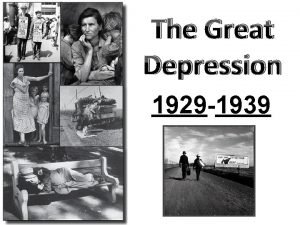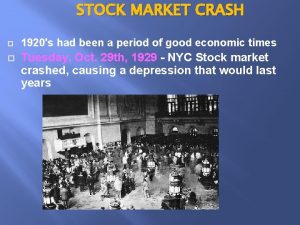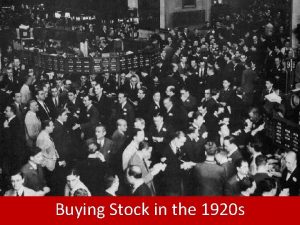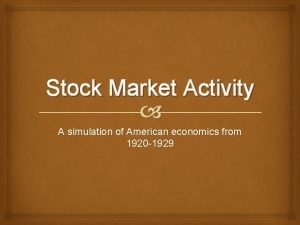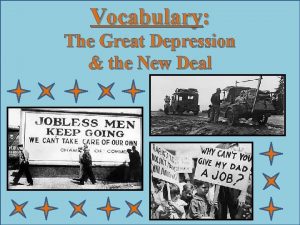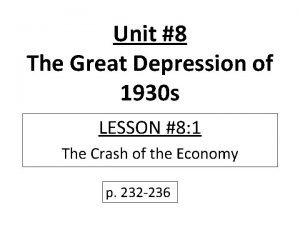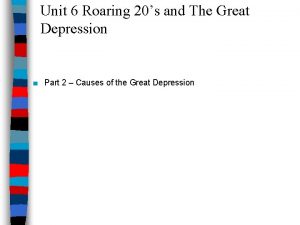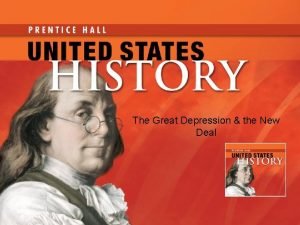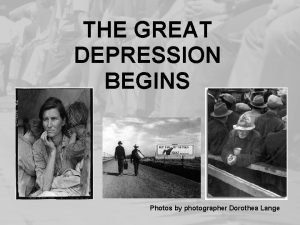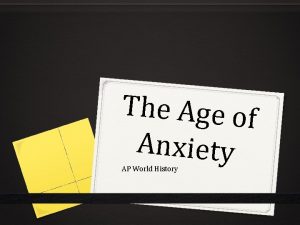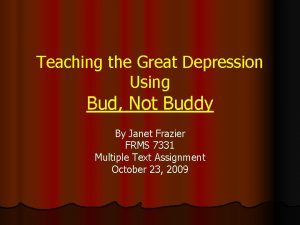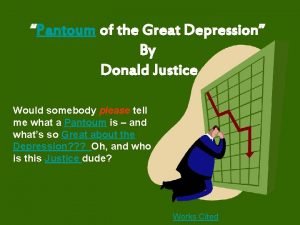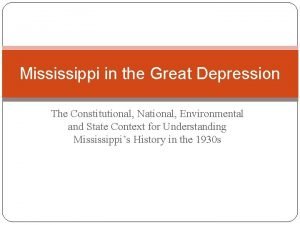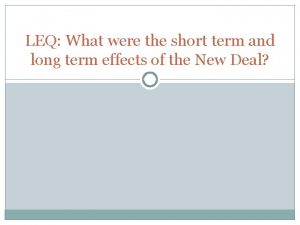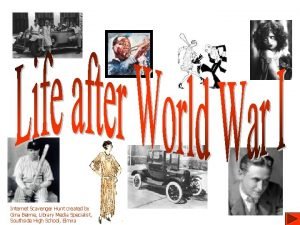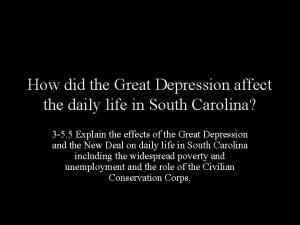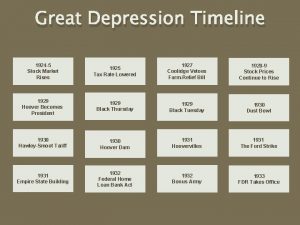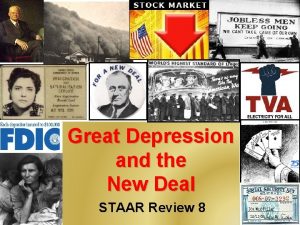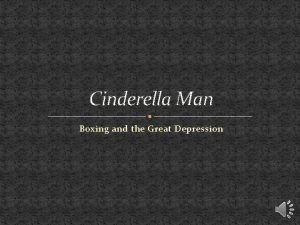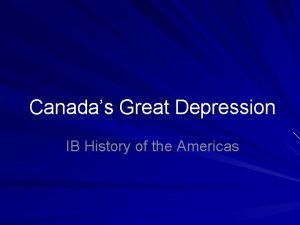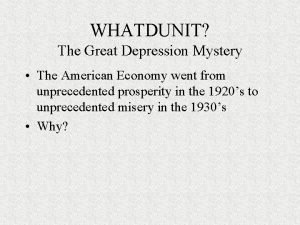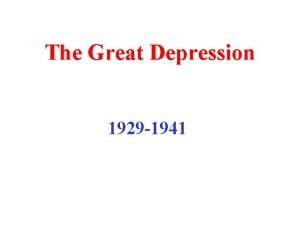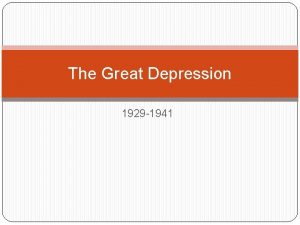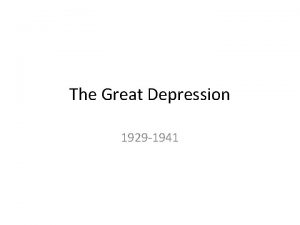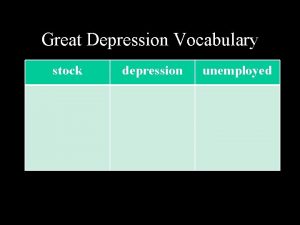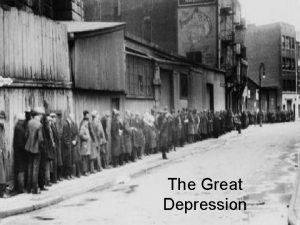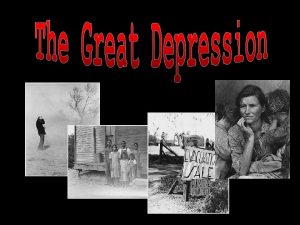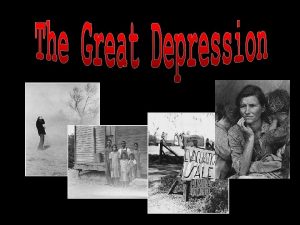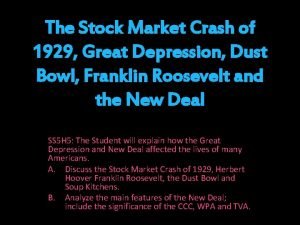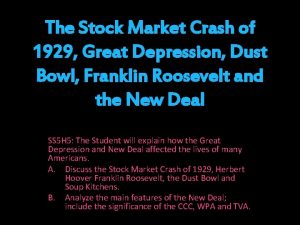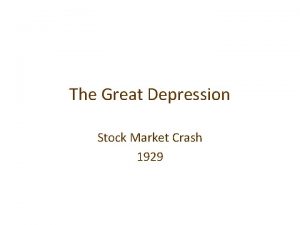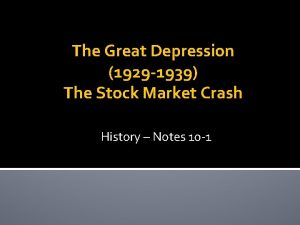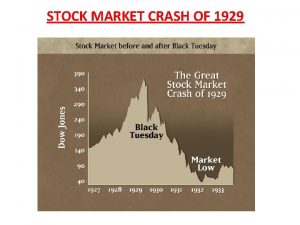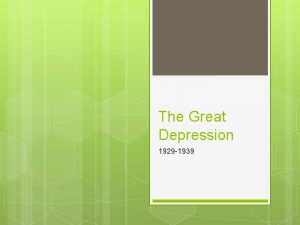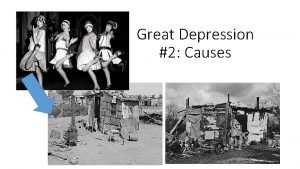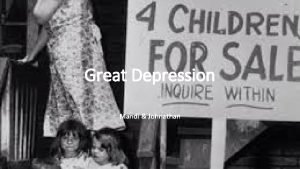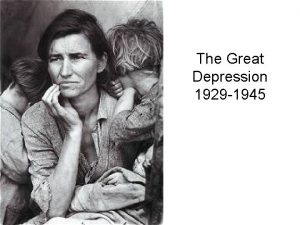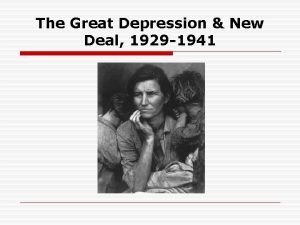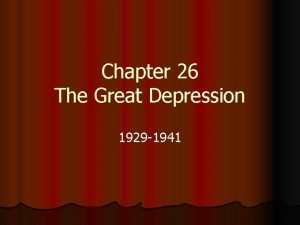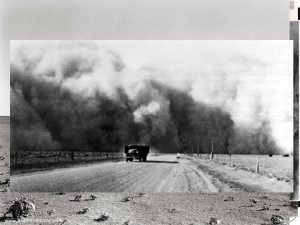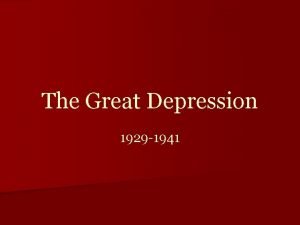The Great Depression 1929 1941 The Stock Market































- Slides: 31

The Great Depression 1929 -1941

The Stock Market • 1920’s a (bull market) occurred which is a long period of rising stock prices, that lead to many Americans to invest heavily in stocks. Stock market tripled from 1920 to 1929. • Buyers engaged in (speculation) buying stocks and hoping to “get rich quick”.

Margin and Margin Call • Investors began buying stocks on (margin) they made only a small cash down payment and paid rest off when stock was sold. • Stock brokers were very sensitive to any fall in stock prices; which lead to (margin calls) when investors demanded repayment of the loans at once when stocks dropped.

Possible Causes of the Great Depression Causes • • Overproduction Shaky Banking Practices Speculation and Stock Market Crash Restricted international trade • Effects • Low consumption of goods • Massive unemployment • Bank/Business Failures

Black Thursday and Tuesday • October 24, 1929 “Black Thursday” The Stock Market Crashed; Wall Street stocks lost $10 to $15 billion in value. • October 29, 1929 “Black Tuesday” lost estimated $16 billion dollars in value.

Impact of the Great Depression • The Depression was a national nightmare’ people felt worthless after the prosperity of the 20’s. • Many went hungry; millions joined bread lines or soup kitchens for free handouts. • Families lost their homes; homeless people put up shacks on unused or public lands, forming communities called (shantytowns).

The Homeless • Blaming President Hoover, for their plight, people referred to such shantytowns as (Hooverville's). • Homeless people known as “hobos” began wandering around the country often riding the rails looking for a better life.

Escaping the Depression • Americans escaped through entertainment. (Movies, or listened to radio programs. ) • Walt Disney produced first feature-length animated film Snow White and the Seven Dwarfs; MGM produced The Wizard of Oz. • Gone With the Wind topped the Depression-era epics.

• Radio melodramas were sponsored by makers of laundry soaps, nicknamed “soap operas”. • Novelist John Steinbeck and photographers like Dorothea Lange recorded the misery of the Great Depression.

The Dust Bowl • Engulfed the Dakotas to Texas (Great Plains), dust storms ravaged America’s pastures and wheat fields became a vast desert. • Causes: Drought, uprooting of wild grass, and planting of vast wheat fields drained the top soil of its moisture. • Effect: Families lost their farms packed up and headed west towards California in search for jobs.

Hoovers Response • Hoover rejected demands by the government to provide direct relief to Americans believing it would ruin Americans “rugged individualism”. • Hoover believed private organization should provide such emergency relief not the government.

Harley-Smoot Tariff Act • Aimed to protect American manufacturers from foreign competition. • Raised tariffs to the highest level in American history. • Damaged trade between American and foreign countries.

Mexican Reparations Act • With less demand for workers, white American farmers sought these jobs taken by Mexicans. • Hoover authorized the deportation of 2 Million Mexicans; many were forced to move back to Mexico some being U. S. citizens that were separated from their family.

Hoover’s Programs • National Credit Corporation (NCC) created a pool of money to rescue troubled banks to continue lending money in their communities. • Reconstruction Finance Corporation (RFC) gave emergency loans to banks and businesses, hoping to spur business eventually trickling down to average Americans. • Hoover’s policies were seen as too little, too late.

Farmers and the Bonus Army • After WWI farmers had heavy mortgages when prices sank they couldn’t even earn their expenses back. • Farmers tried raising crop prices by destroying their crops and produce. • The “Bonus Army” WWI veterans marched on Washington to claim their bonuses promised from the war; they were cleared out by tear gas, fire, tanks, and bayonets.

Roosevelt and the New Deal 1933 -1935

Franklin D. Roosevelt Takes Office • “New Deal” Roosevelt’s policies for ending the Depression. (Relief, Recovery, Reform) • Roosevelt’s Inaugural Address “the only thing we have to fear is fear itself. ” Believed he could make things better offered an energy and optimism that gave people hope.

New Style of Leadership • Roosevelt assembled a group of talented people from the leading American Universities known as the “Brain Trust”. • Roosevelt addressed the American people directly through radio addresses, known as “fireside chats” explaining his policies in simple conversational terms.

Relief • Relief: for persons in need by providing money for loans and jobs. • Banks – (Bank Holiday)(FDIC) stop bank runs and restore confidence in banking system. • Home and Farm owners - (Federal Housing Administration) Insures loans made by banks and other private lenders for home building. • Unemployed - (Federal Emergency Relief Act, Civilian Conservation Corps, Public Works Administration, Works Progress Administration. ) Provided simple jobs for unemployed.

Reform • Reform: Programs to ensure another depression doesn’t happen. • Federal Deposit Insurance Corporation - insures bank accounts to a certain amount. (Still active today) • Tennessee Valley Authority- build dams to control floods and provide electricity. • Securities and Exchange Commission- monitor stock market prevent fraud. • National Industrial Recovery Act, Wagner Act, and Norris-La. Guardia Act favoring labor. • Social Security Act – for retirees.

Social Security Act 1935 • One of the most important pieces of legislation in American history, purpose was to provide some security for the elderly and for unemployed workers. • Offered money for early retirement to citizens over age of 65 to free up jobs. Extended support to the elderly citizens.

Recovery • Recovery: for nation by passing legislation to assist businesses, labor, and agriculture. • Agricultural Adjustment Act - regulated the production of farmers. • National Recovery Administration - eliminate "cut-throat competition" by bringing industry, labor and government together to create codes of "fair practices" and set prices. 22

Other New Deal Legislation • National Industrial Recovery Act (NIRA) guaranteed the workers right to form unions; and provided industry with a set of rules and codes of fair competition. Replaced by Wagner Act. • Federal Emergency Relief Administration (FERA) funded billions towards state and local governments to fund emergency relief “make work” projects. • Civil Works Administration employed four million people in the winter of 19331934. • Agricultural Adjustment Act regulated the production of farmers. • Civilian Conservations Corps (CCC) offered unemployed young men 18 -25 years old jobs planting trees, fighting forest fires, and building reservoirs.

Monetary Policy • The government’s ability to control how much money is in the economy. (Federal Reserve Act). • 1933 Roosevelt issued an Executive Order outlawing the ownership of gold, except jewelry. • Roosevelt pushed the reliance of fiat money (paper money), in order to expand the money supply and stimulate economic activity.

The Second New Deal: 1935 -1938 • Works Progress Administration (WPA) the spending of $11 billion and employment of 8. 5 million workers on public works. • Federal Number One Program offered work to artists, musicians, theater people, and writers who created many new works. • National Labor Relations Board (NLRB) Organized factory elections by secret ballot to determine whether workers wanted a union; also set up a process of binding arbitration.

Women of the Great Depression • Eleanor Roosevelt – First Lady, political activist, who served as eyes and ears to her husband touring the U. S. encouraging women and the public that life must go on and the needs of life must be met. • Frances Perkins - U. S. Secretary of Labor, first woman appointed to the U. S. Cabinet; One of two to remain in office for Roosevelt’s entire presidency. Helped create Social Security system.

Reaction to New Deal • Conservatives like the Liberty League: Charged Roosevelt with being a traitor to his class and attempting to establish a popular dictatorship. • Radical critics Francis Townsend proposed giving everyone over 65 a pension $200 a month that must be spent in that month. Believed it would create new jobs and an end to Great Depression.

Reaction to the New Deal • Huey Long: Give each American family an income of $5, 000 a year by taxing the rich. Long was assassinated before he was able to mount his campaign. • Father Coughlin: Gave radio addresses to millions, wanting the nationalization of the banks and utilities. Catholic Church ordered an end to Coughlin’s broadcasts.

FDR and the Supreme Court • The U. S. Supreme Court posed the greatest threat to the New Deal. SCOTUS ruled the NIRA and the AAA were unconstitutional. • The NIRA gave the President power to set up codes of fair practice for businesses involved in intrastate trade. Schechter Poultry v. U. S. – SCOTUS ruled that even during a national crisis Congress could not give the President more powers than those granted in the Constitution.

Roosevelt’s Court-Packing Scheme • After Schechter, Roosevelt developed a “Court Packing” Scheme to add Supreme Court justices to pass his legislation in fear of SCOTUS ruling New Deal legislation unconstitutional. • This scheme was viewed as an attempt to upset traditional separation of powers; and was condemned by the public and rejected by Congress.

Impact of the New Deal • Roosevelt's New Deals increased the power of the federal government dramatically; involving it in roles of social and economic life never seen before in America. • Although Roosevelts New Deal didn’t end the Depression, Roosevelts attention shifted towards the militaristic governments gaining power in Europe and in Asia.
 Stock market crash cartoon
Stock market crash cartoon Great stock market crash 1929
Great stock market crash 1929 Black tuesday great depression
Black tuesday great depression Stock market crash in 1929
Stock market crash in 1929 Fun facts about the stock market crash of 1929
Fun facts about the stock market crash of 1929 Mammoth oil 1920
Mammoth oil 1920 Tel tone stock 1929
Tel tone stock 1929 Leader challenger follower nicher
Leader challenger follower nicher Market segmentation lesson
Market segmentation lesson Great depression vocabulary
Great depression vocabulary Rarig great depression
Rarig great depression Great depression
Great depression The ingenious quarterback
The ingenious quarterback Foreclosure great depression
Foreclosure great depression Five effects of the great depression
Five effects of the great depression Five effects of the great depression
Five effects of the great depression How did the great depression impact the world
How did the great depression impact the world What is the dawes plan
What is the dawes plan Bud not buddy great depression
Bud not buddy great depression Donald justice pantoum of the great depression
Donald justice pantoum of the great depression Summary of great depression
Summary of great depression What is deflation
What is deflation Okies great depression
Okies great depression The great depression leq
The great depression leq Roaring twenties scavenger hunt answers
Roaring twenties scavenger hunt answers How did the great depression affect daily life
How did the great depression affect daily life Great depression timeline
Great depression timeline Great depression causes
Great depression causes Brief summary of the great depression
Brief summary of the great depression Cinderella man great depression
Cinderella man great depression Birth rate during the great depression
Birth rate during the great depression Overspeculation great depression
Overspeculation great depression


